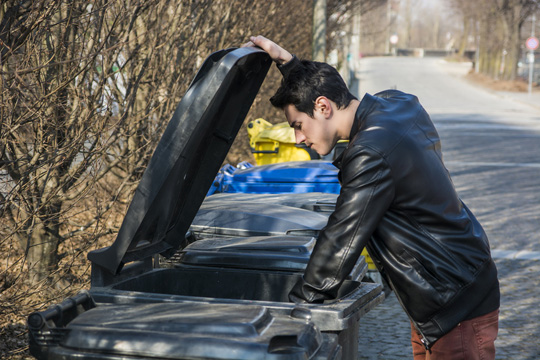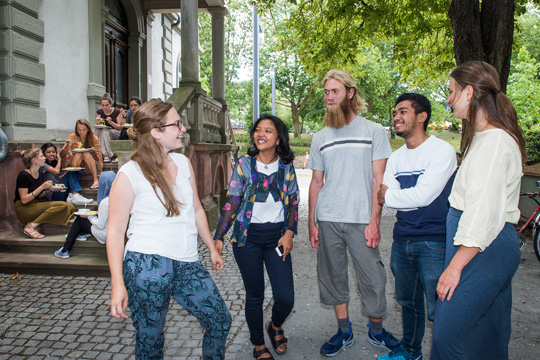Society, Gender and Dumpster Diving
Freiburg, Jul 28, 2017
How are social categories and conventions created – and how are they destroyed again? For four weeks, ethnology and political science students from Indonesia and Germany worked together in small teams. The research field was broad: from Freiburg's gay scene to non-fascist skinheads to migrant rappers and food scrap collectors in the cafeteria. A special note: The Indonesian students brought the ideas with them after researching them from home. In a subsequent conference, they presented their findings.
 Dumpster diving is practiced across many cities in Germany. However, it is an unknown phenomenon in Indonesia.
Dumpster diving is practiced across many cities in Germany. However, it is an unknown phenomenon in Indonesia.
Photo: theartofphoto/Fotolia
The students Sarah Gomm, Vita Anggraeni, Luisa Arndt and Patrick Birch are chatting quietly during their lunch break on their final workshop day. They have already held their presentations and are enjoying tomato soup and pasta. They have spent the past four weeks examining the Freiburg dumpster diving scene. They are mostly young people who retrieve edible food from supermarket dumpsters. Anggraeni came upon the subject when she met a German tourist while in Indonesia. "He told me that's how he survives when he travels," reports the budding anthropologist. That is how she found out that such a scene exists in Germany, thereby prompting her to conduct a lot of research on the topic. She learned about the anti-capitalist thought behind the movement. "It was a completely foreign idea to me because there is nothing like it in Indonesia," she explains.
 First the work, then the feast: The students introduced their research findings and then enjoyed a meal of pasta and tomato soup.
First the work, then the feast: The students introduced their research findings and then enjoyed a meal of pasta and tomato soup.
Photo: Klaus Polkowski
The four students got to know one another through a program intended to strengthen intercultural research: Prof. Dr. Judith Schlehe from the Department of Ethnology at the University of Freiburg founded the "training research cooperation with Indonesia" 13 years ago. In the beginning, the cooperation was only with the Gadjah Mada University in Yogyakarta; in 2014 the Hasanuddin University in Makassar joined the group. "We evolved the project from a tandem to a team model," says the ethnologist. In 2011 students of international relations joined as well. Schlehe runs the program together with her Freiburg colleague Prof. Dr. Jürgen Rüland from the Department of Political Science and with researchers from Indonesia.
Contact to the scene
The three German team members were quite impressed that their Indonesian counterparts had never heard of dumpster diving before because in Germany it is quite commonplace. "Every student has tried it at least once," says Birch. But the point for most is less about politics and more about having the experience and a sense of adventure. "It was Vita who told us that is something quite unusual," adds Arndt. Together they sought contact with the dumpster diving scene, conducted interviews and even observed some people in action. Originally, Anggraeni had wanted to examine the role gender plays in it.
"But it was quickly evident that such a question doesn't apply to the scene here because the women in particular resisted the categorization," explains Gomm. It was an unexpected response for Anggraeni because gender questions play a big role in society in Indonesia where a lot still has to be done in terms of gender equality. In alignment with the idea behind the research program, the group discussed their various perspectives and then changed the focus of their teamwork from the gender question to the idea of self-categorization within the scene.
A year in Germany, a year in Indonesia
The students got to experience a worldwide unique opportunity, emphasizes Schlehe. "What is unique is the fact that the project is so diverse." That means that the students work together on an annually rotating basis in Indonesia and Freiburg. Obviously, they are only able to come to relatively limited conclusions in the short time they have. It is more about learning how to basically apply the learned method. It is of particular importance to Schlehe that the different perspectives from the students from Freiburg and Indonesia are reflected in the work. They had to play with the various perspectives, turn them around and reflect upon them.
Schlehe is happy that the program, which is financed by the German Academic Exchange Service and supported by the participating universities as well, has enjoyed so much success over the years. "The students learn the intimate details of another culture and have the opportunity to sharpen their view of their own culture," she says. Judith Schlehe considers it to be an appropriate research approach inorder to take a closer look at complex reality and to work together at eye level within a team. More than one participant has come up with the topic for their final thesis through this program – not to mention the private contacts beyond their own cultural borders to boot.
Petra Völzing

